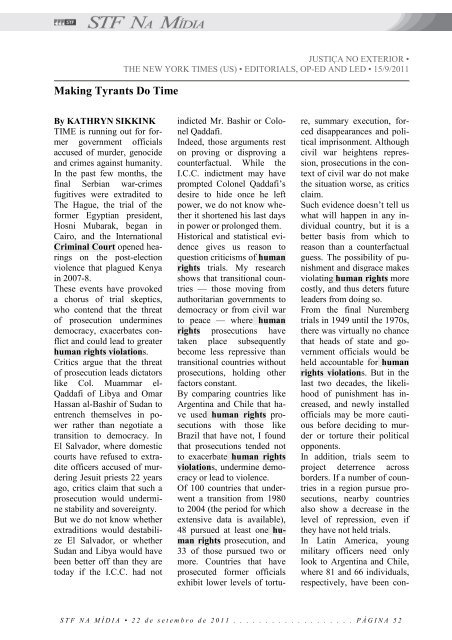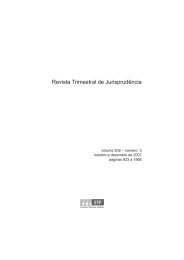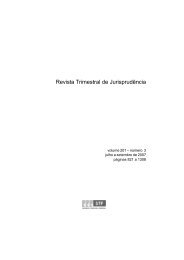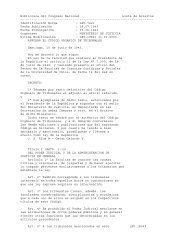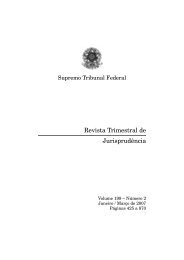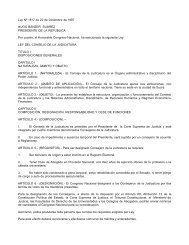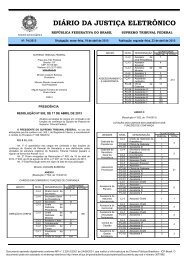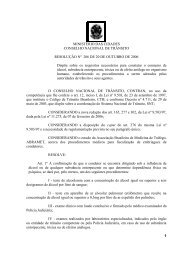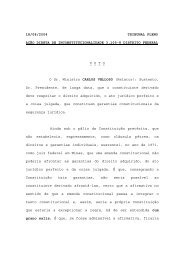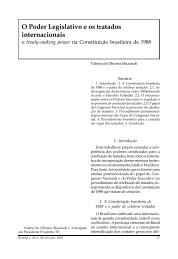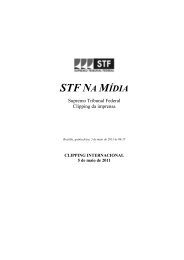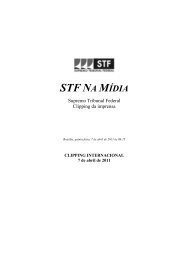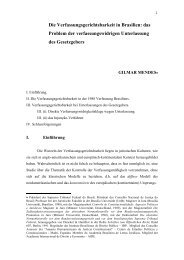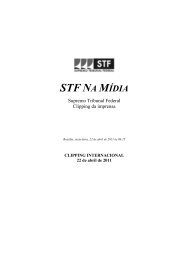STF NA MÍDIA
STF NA MÍDIA
STF NA MÍDIA
You also want an ePaper? Increase the reach of your titles
YUMPU automatically turns print PDFs into web optimized ePapers that Google loves.
Making Tyrants Do Time<br />
JUSTIÇA NO EXTERIOR •<br />
THE NEW YORK TIMES (US) • EDITORIALS, OP-ED AND LED • 15/9/2011<br />
By KATHRYN SIKKINK<br />
TIME is running out for former<br />
government officials<br />
accused of murder, genocide<br />
and crimes against humanity.<br />
In the past few months, the<br />
final Serbian war-crimes<br />
fugitives were extradited to<br />
The Hague, the trial of the<br />
former Egyptian president,<br />
Hosni Mubarak, began in<br />
Cairo, and the International<br />
Criminal Court opened hearings<br />
on the post-election<br />
violence that plagued Kenya<br />
in 2007-8.<br />
These events have provoked<br />
a chorus of trial skeptics,<br />
who contend that the threat<br />
of prosecution undermines<br />
democracy, exacerbates conflict<br />
and could lead to greater<br />
human rights violations.<br />
Critics argue that the threat<br />
of prosecution leads dictators<br />
like Col. Muammar el-<br />
Qaddafi of Libya and Omar<br />
Hassan al-Bashir of Sudan to<br />
entrench themselves in power<br />
rather than negotiate a<br />
transition to democracy. In<br />
El Salvador, where domestic<br />
courts have refused to extradite<br />
officers accused of murdering<br />
Jesuit priests 22 years<br />
ago, critics claim that such a<br />
prosecution would undermine<br />
stability and sovereignty.<br />
But we do not know whether<br />
extraditions would destabilize<br />
El Salvador, or whether<br />
Sudan and Libya would have<br />
been better off than they are<br />
today if the I.C.C. had not<br />
indicted Mr. Bashir or Colonel<br />
Qaddafi.<br />
Indeed, those arguments rest<br />
on proving or disproving a<br />
counterfactual. While the<br />
I.C.C. indictment may have<br />
prompted Colonel Qaddafi’s<br />
desire to hide once he left<br />
power, we do not know whether<br />
it shortened his last days<br />
in power or prolonged them.<br />
Historical and statistical evidence<br />
gives us reason to<br />
question criticisms of human<br />
rights trials. My research<br />
shows that transitional countries<br />
— those moving from<br />
authoritarian governments to<br />
democracy or from civil war<br />
to peace — where human<br />
rights prosecutions have<br />
taken place subsequently<br />
become less repressive than<br />
transitional countries without<br />
prosecutions, holding other<br />
factors constant.<br />
By comparing countries like<br />
Argentina and Chile that have<br />
used human rights prosecutions<br />
with those like<br />
Brazil that have not, I found<br />
that prosecutions tended not<br />
to exacerbate human rights<br />
violations, undermine democracy<br />
or lead to violence.<br />
Of 100 countries that underwent<br />
a transition from 1980<br />
to 2004 (the period for which<br />
extensive data is available),<br />
48 pursued at least one human<br />
rights prosecution, and<br />
33 of those pursued two or<br />
more. Countries that have<br />
prosecuted former officials<br />
exhibit lower levels of torture,<br />
summary execution, forced<br />
disappearances and political<br />
imprisonment. Although<br />
civil war heightens repression,<br />
prosecutions in the context<br />
of civil war do not make<br />
the situation worse, as critics<br />
claim.<br />
Such evidence doesn’t tell us<br />
what will happen in any individual<br />
country, but it is a<br />
better basis from which to<br />
reason than a counterfactual<br />
guess. The possibility of punishment<br />
and disgrace makes<br />
violating human rights more<br />
costly, and thus deters future<br />
leaders from doing so.<br />
From the final Nuremberg<br />
trials in 1949 until the 1970s,<br />
there was virtually no chance<br />
that heads of state and government<br />
officials would be<br />
held accountable for human<br />
rights violations. But in the<br />
last two decades, the likelihood<br />
of punishment has increased,<br />
and newly installed<br />
officials may be more cautious<br />
before deciding to murder<br />
or torture their political<br />
opponents.<br />
In addition, trials seem to<br />
project deterrence across<br />
borders. If a number of countries<br />
in a region pursue prosecutions,<br />
nearby countries<br />
also show a decrease in the<br />
level of repression, even if<br />
they have not held trials.<br />
In Latin America, young<br />
military officers need only<br />
look to Argentina and Chile,<br />
where 81 and 66 individuals,<br />
respectively, have been con-<br />
S T F N A M Í D I A • 2 2 d e s e t e m b r o d e 2 0 1 1 . . . . . . . . . . . . . . . . . . . P Á G I N A 5 2


